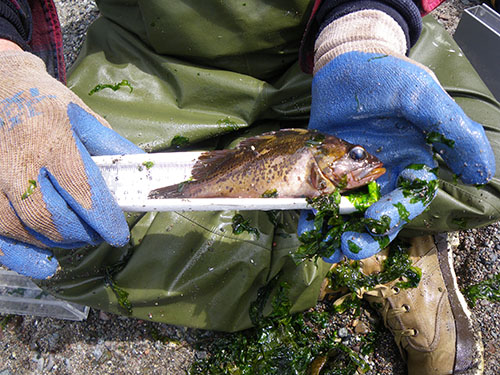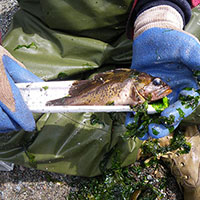— from Russel Barsh, Kwiaht —
 Researchers at the conservation laboratory Kwiaht are studying reproduction, growth and dispersal of Copper Rockfish around the south shores of Lopez Island. As part of the study, some recreational anglers are measuring and tagging Copper Rockfish bycatch before releasing them. The project is using small tubular orange tags attached to the large dorsal fin on these fish. There is a unique number on each tag.
Researchers at the conservation laboratory Kwiaht are studying reproduction, growth and dispersal of Copper Rockfish around the south shores of Lopez Island. As part of the study, some recreational anglers are measuring and tagging Copper Rockfish bycatch before releasing them. The project is using small tubular orange tags attached to the large dorsal fin on these fish. There is a unique number on each tag.
Kwiaht Director Russel Barsh says that the thin, narrow tags do not interfere with swimming, and may eventually fall off as the fish grows. “Electronic tags would produce more data,” Barsh adds, “but at considerable expense. Passive tagging is economical, and gives anglers an opportunity to participate in research and monitoring by collecting data from fish they are already catching and releasing.”
Copper Rockfish prey heavily on shrimp, Barsh says, and one question is whether these relatively sedentary fish congregate seasonally to pursue shrimp migrations through the islands. SCUBA observations as early as 1972, and robot-camera (ROV) videos made by Kwiaht in 2011, suggest that very large aggregations of rockfish are not unusual.
Another question is whether rockfish growth rates are affected by changing water temperatures. In general, Barsh says, warmer waters produce more plankton that can feed shrimp, crabs and “forage fish.” But when the sea surface heats up, many marine animals move down into deeper, cooler water. This could affect the relationship between rockfish and their prey.
If you bring up a tagged Copper Rockfish, write down the location (nearest point of land), the tag number, the date, and the length of the fish before your release it. Do not remove the tag. Email the information to kwiaht@gmail.com or leave a voice message at (360) 468-2808. Include your name and address if you would like to receive an illustrated certificate of appreciation from Kwiaht’s rockfish program.
The tagging study is permitted by the Washington State Department of Fish and Wildlife, and is funded by individual donations in the islands.
**If you are reading theOrcasonian for free, thank your fellow islanders. If you would like to support theOrcasonian CLICK HERE to set your modestly-priced, voluntary subscription. Otherwise, no worries; we’re happy to share with you.**








